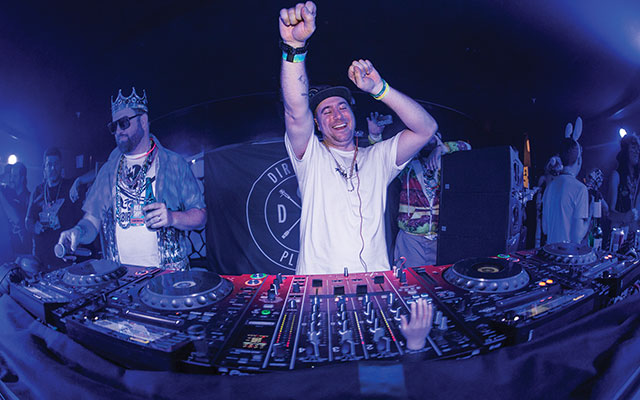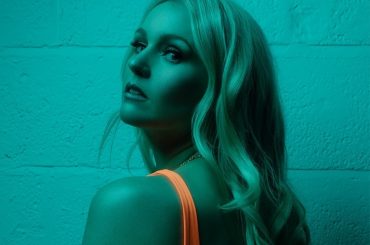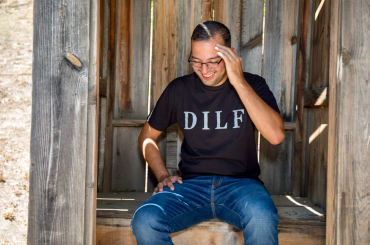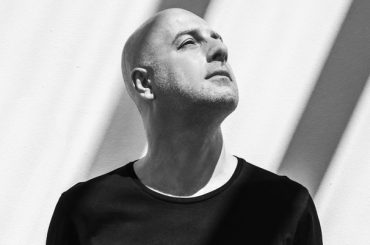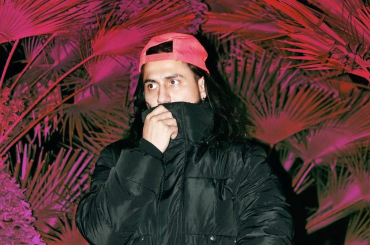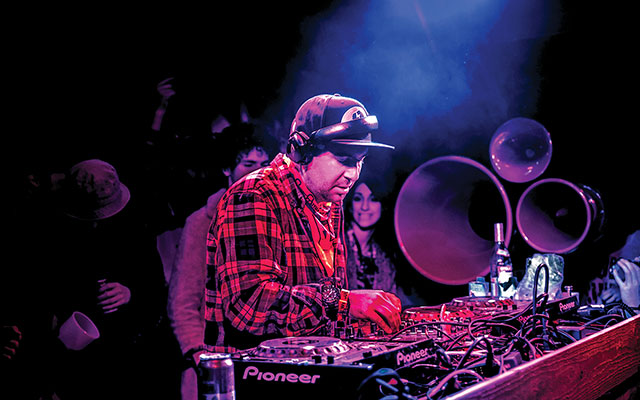
Martin: My brother was always giving me records. My brother’s roommates all DJed in college, and I thought they were like the coolest kids ever. I’d go visit and be like, “Dude, your roommates are so awesome,” but he never wanted to DJ. But he also knew every single good song. When I was DJing, he was always giving me secret weapons. I’d be like, “Dude, I don’t get it! You have the best taste ever; you’re giving me all this new shit you find every week—why don’t you do it?” Finally, there was just one day in San Francisco that he came over and I taught him how to match beats. I always say that it’s the best and worst thing that happened to him because he found his passion and never looked back, but he also gave everything else up. He was valedictorian, straight-A college student with so many options and possibilities, whereas I was this fucking class clown, and this was my only option.
DJ Times: Does he still give you secret weapons?
Martin: Oh yeah, to this day! I was talking to him tonight; he told me he was going to send me this new track. Chris and I are each other’s biggest allies always. I’m giving him all the stuff that I make and he’s giving me feedback. We’ve got a good relationship like that.
DJ Times: Which came first for you: DJing or production?
Martin: DJing came way first. I couldn’t afford a computer.
DJ Times: Did that happen after you moved to San Francisco?
Martin: I moved to San Francisco, and there was no drum-n-bass scene there. There is—I don’t want to sell it short—but I couldn’t find records like I could in New York. I started falling in love with house music. I graduated from school in 2001, and it took me about six months of bartending to save up enough to buy my first computer. I had just been DJing as a hobby since I was 16. I started teaching myself how to [produce].
DJ Times: What differences did you find between the two cities?
Martin: It’s weird. I was in two different places in my life. When I was living in New York, it was larger than life. Going to Sasha and Digweed at Twilo was like, “These people are gods!” I was just this little raver kid climbing onto the speaker and spending all of my money clubbing and going there from the time the doors opened to the time the doors closed.
DJ Times: And in San Francisco?
Martin: It was like, “Oh, my friends are all the DJs. Everyone here is really supportive and cool.” It wasn’t such a big deal anymore. I can’t look at it in an objective way because when I was in New York it was larger-than-life—there was such a gap between me and what the people in the booth were doing. By the time I moved to San Francisco, that gap narrowed.
DJ Times: So it was more homey and comfortable?
Martin: Yeah, yeah. That was one of the reasons why Dirtybird grew and was successful. There was such a great support system of locals and legends alike in San Francisco. People really supported each other.
DJ Times: It seems like San Francisco is more conducive to DJ collectives forming, whether it’s Dirtybird or something like Honey Soundsystem. New York’s got different parties and promoters.
Martin: Promoters in New York were ruthless with each other. There were stories of people having a party the same night as another promoter and they would call the Fire Marshall and your party would get shut down. In San Francisco, it’s like, “Oh, you’re doing your party that night? Alright, we’ll do ours the next night.” Everyone communicates and it’s all love. It’s a lot smaller and tight-knit of a scene. They’re totally different playing fields.
DJ Times: Has San Francisco evolved and changed over the past 10-15 years?
Martin: It’s changed a lot in the sense that when I was first going out, there were a lot of underground warehouse parties. There was kind of a backlash to the whole chi-chi Miguel Migs/Naked Music vibe. There was a dot-com boom during that time, so the clubs were all shiny-shirt dudes with sunglasses at night and stuff like that. Not San Francisco locals, but people that had just come to the city for tech jobs. To balance that out, there was the underground loft and warehouse spaces with the Sunset Crew and the Wicked Crew doing these dirty, awesome underground parties.
DJ Times: And now?
Martin: Now, I think the city cracked down on that a little bit and the clubs are a lot cooler. My friends who were going out to these parties grew up and bought clubs, so that vibe is still going on, but in a legitimate space.
DJ Times: Speaking of the dot-com boom, do you think the Silicon Valley explosion has affected the scene at all?
Martin: I don’t know because I’m not there very much anymore. It’s changed supposedly so much in the past two years. I literally go out there four times a year for our [Dirtybird Quarterly] party. I’m just not home. And when I am, I’m in the studio or I’m chilling with my girl. Or I just go out to happy-hour with my friends. I don’t have time to go out on weekends to scope the scene. I think that San Francisco’s scene is always thriving, though. It’s always awesome. Good music is going to attract good people.
DJ Times: Now did Dirtybird launch?
Martin: I moved to San Francisco in 1999, and Dirtybird started as a party in 2003. It was just a renegade party. My brother bought a sound system once he fell in love with DJing. He didn’t want to go down the route of having to pass out his mix-CDs just to get an opening gig. He said, “Let’s skip the line and do our own party.” He put a sound system on his credit card and bought a generator, and we just started doing the Dirtybird BBQ. At the time, I had just met Barclay [Claude VonStroke] not much earlier than that.
DJ Times: How did you two meet?
Martin: It’s really random. My brother was working at a company called One Infinity that did web-design stuff. His business partner’s mom was grocery shopping and met Barclay’s mom, and they just started talking to each other. It’s so funny. How many times has your mom said to you, “I met the nicest person, you should meet them!” and you’re like, “Whatever, Mom.” If they hadn’t have met, though, none of this would’ve happened.
DJ Times: So they arranged a play date?
Martin: Yeah! At the time, Barclay was working on this documentary on “How to DJ” and needed some music for it. My brother was helping him film and was like [to me], “You’ve got to meet this guy. He’s interviewed 30 successful DJs and knows the keys to success.” I had this sit-down with Barclay, and he was like, “If you give me some music for this documentary, I’ll help you out, and we’ll see if what I’ve learned actually can help someone.”
DJ Times: So, what happened?
Martin: He became my manager and, shortly after that, I signed a record to Buzzin’ Fly—Ben Watt’s record label—for my first release “Sad Piano.” After that, [Barclay] saw that what he was teaching was working, and he was like, “I can do this.” At the time, he met his wife, and she gave him one year to try and make it. If he didn’t make more money than her that year, then he had to get a real job. Then he blew up as Claude VonStroke.
DJ Times: Things worked out.
Martin: Shortly after that, the renegade party built steam and we just needed a place to put out our music because ours was kind of weird and quirky. If you listen to the early Dirtybird releases, they’re pretty out there, and no one was really doing that at the time. That was when Barclay decided that we needed a label for the sound. He started the label, and it’s just grown into this giant, amazing, awesome movement, brand, family, party, everything!
DJ Times: There’s always an air of fun surrounding everything Dirtybird does. Is that a conscious choice?


